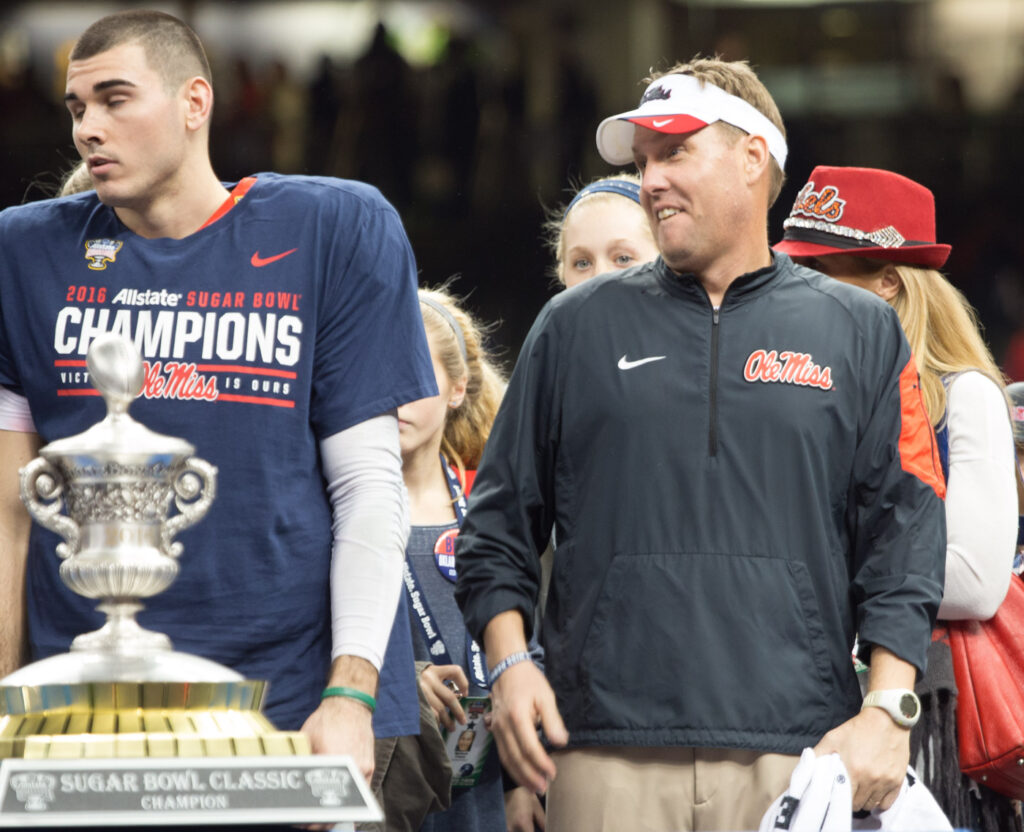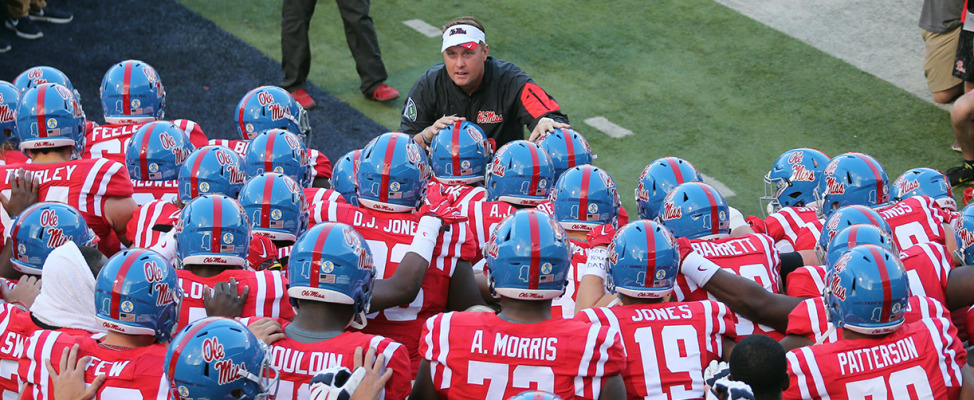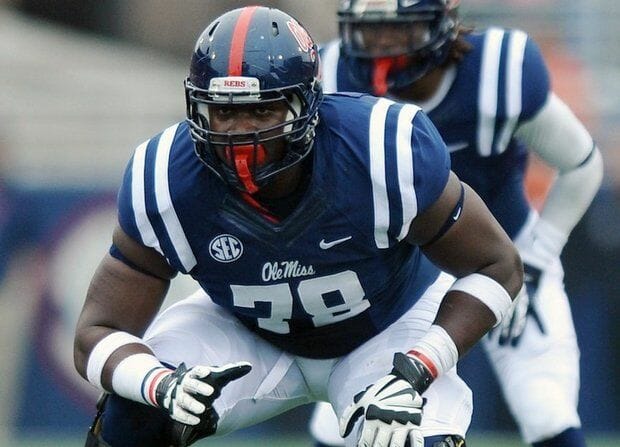Featured
NCAA Hits Ole Miss with Two-Year Bowl Ban, Scholarship Reductions

Coach Hugh Freeze is shown here in better days, celebrating the Rebels’ decisive Sugar Bowl Victory at the Superdome on New Year’s Day. Photo by Bill Barksdale
The verdict is in from the NCAA’s five-year investigation of Ole Miss athletics, and the Rebels took a hard hit.
In a ruling released Friday morning, the NCAA imposed a two-year bowl ban, which will include the university’s one-year self-imposed ban this year, and took away 13 scholarships over three years, including the university’s 11 self-imposed reductions. Former assistants named in the investigation received show-causes, including David Saunders (eight years) and Barney Farrar (five years). A show-cause essentially makes it very difficult for a coach to find employment.
The NCAA said former head coach Hugh Freeze was ultimately responsible for the violations committed by his staff and “failed to monitor certain aspects of the recruiting process and … the actions of boosters.” Freeze’s penalty: If he gets hired as the head coach of another school between Dec. 1, 2017, and Nov. 30, 2018, he will be suspended from coaching for that team’s first two conference games.
The investigation started in September 2012, with hundreds of interviews with student-athletes, coaches, boosters and other witnesses.
Ole Miss faced 21 allegations, including 15 Level 1 claims, considered the most serious. The university itself faced a Level 1 charge of lack of institutional control, while Freeze was charged with violating his head coach responsibility legislation, also a Level 1 allegation.
The university challenged portions of nine of the 21 allegations, including the charge of lack of institutional control. Freeze himself stepped down from the head coaching position this summer after it was discovered he had made phone calls to an escort service.
Some of the most controversial allegations revolved around Leo Lewis, now a linebacker at Mississippi State, whose claims the university has contested as inconsistent and biased, and former UM staffer Barney Farrar.
Ole Miss challenged claims that Farrar had provided a $10,000 cash payment to Lewis, saying there was not “sufficient credible and persuasive factual support” for the allegation. All totaled, the NCAA alleged that boosters paid between $13,000 and $15,600 in cash to Lewis, who eventually went to Mississippi State.
Along with former defensive line coach Chris Kiffin, Farrar was also accused of arranging for two prospective recruits and a family member to receive free merchandise valued at $2,800. Farrar also allegedly arranged for transportation and hotel lodging worth $2,272 and was accused of providing false or misleading information to the NCAA’s enforcement staff.
Former staffers David Saunders and Chris Vaughn, who worked under former head coach Houston Nutt, were accused of ACT fraud. The university has admitted that these violations occurred. Vaught and Saunders reportedly told recruits to take the college entry exam at a specific school in Wayne County and to leave unanswered any questions they weren’t sure about, with the correct answers to be filled in later
Other allegations centered around impermissible free meals, hotel lodging, transportation and merchandise for recruits. In one case, former assistant coach Chris Kiffin supposedly let a player sleep on his couch for two nights without charging him for it.
Timeline: How We Got Here
In 2013, Freeze reeled in a top-10 recruiting class that stunned the nation and brought renewed attention to the football program. Detractors at other universities, including Mississippi State, suspected foul play, but Freeze and the university denied it.
The NCAA was already in town, investigating the firing of Ole Miss women’s basketball coach Adrian Wiggins in 2012. Wiggins had been hired just seven months prior to being let go due to potential violations he committed while coaching at Fresno State. The resignation of track and field coach Brian O’Neal raised eyebrows as well. The NCAA’s investigation eventually expanded from the women’s basketball team to the entire athletic program.
In 2013, a defiant Freeze famously tweeted about rumors of cheating, saying, “If you have facts about a violation, send it to compliance@olemiss.edu. If not, please do not slander these young men or insult their family.”
The investigation continued, and so did the Rebels. On-field success kept the critics at bay, and the program looked to be in good shape. Freeze took over a struggling 2-10 team and led them to two consecutive bowl wins. On New Year’s Day of 2015, the Rebels suffered a painful loss in the Peach Bowl—their first major bowl appearance since the Sugar Bowl in 1970—but potential recruits seem undeterred.

Photo by Joshua McCoy/Ole Miss Athletics
Heading into the 2015 season, questions surrounding Laramy Tunsil’s eligibility began to creep in after a conflict with his step-father was made public and the latter claimed Tunsil had accepted improper benefits from sports agents. Freeze kept Tunsil on the bench for the Rebels’ first seven games in the hopes of appeasing the NCAA. At this point, many believed Tunsil’s situation was an isolated incident and the investigation would go no further.
Weeks after a crowd-pleasing Sugar Bowl victory on New Year’s Day 2016, it was announced that the athletic program was facing 28 allegations across three sports: women’s basketball, track and field, and football. Although fans quickly dismissed the 13 football-related allegations as violations by the Houston Nutt staff, this turned out not to be the case. However, some allegations did spring from 2010, including the alleged fixing of recruits’ ACT scores.

Laremy Tunsil during his time as on Ole Miss Rebel. Photo Courtesy of Joshua McCoy
In April 2016, Tunsil on NFL Draft Night appeared to admit to accepting money from Ole Miss coaches during his collegiate career, setting off a sports media firestorm and prompting the NCAA to reopen its investigation into the football program. In December 2016, Ole Miss fired Farrar after his name came up in a text message that seemed to show Tunsil asking him for money.
As the investigation dragged on, a visibly frustrated Hugh Freeze met the gathered media during the 2017 SEC Media Days and answered questions about it. “I really want everyone around our program and everyone within our program to do everything the right way,” he said. “My parents raised me, and Proverbs said a good name is to be desired above great riches.”
Speculation continued to follow the team throughout the season, and there was no light at the end of the tunnel for the Rebels. In mid-July 2017, former head coach Houston Nutt filed a lawsuit against Ole Miss alleging the institution had executed a “carefully orchestrated misinformation campaign” designed to “mislead the media, Ole Miss boosters and potential recruiting prospects” about the investigation and “place undue blame on Nutt, contributing to his difficulty in finding another coaching job.”
As details from Nutt’s lawsuit came to light, Freeze resigned as head coach on July 20, 2017, when school officials uncovered a “pattern” of questionable behavior that included phone calls to a female escort service. Matt Luke stepped in as interim head coach at that time, and Ole Miss and Nutt settled the lawsuit in October, with the university issued a statement of apology.
By Rick Hynum, editor-in-chief, and Adam Brown, sports editor





















































Ruby Begonia
December 1, 2017 at 10:23 am
I hope bjork is cleaning out his desk.
Loretta
December 1, 2017 at 7:40 pm
A couple of months ago, Hotty Toddy reported that whether Ole Miss has a winning or losing team has no impact on our hotel and restaurant trade. Thank goodness! Some people think winning is everything. Imagine that!
screenrecorderwindows10.com
April 15, 2018 at 12:34 am
Now it is the screen recorder for windows.